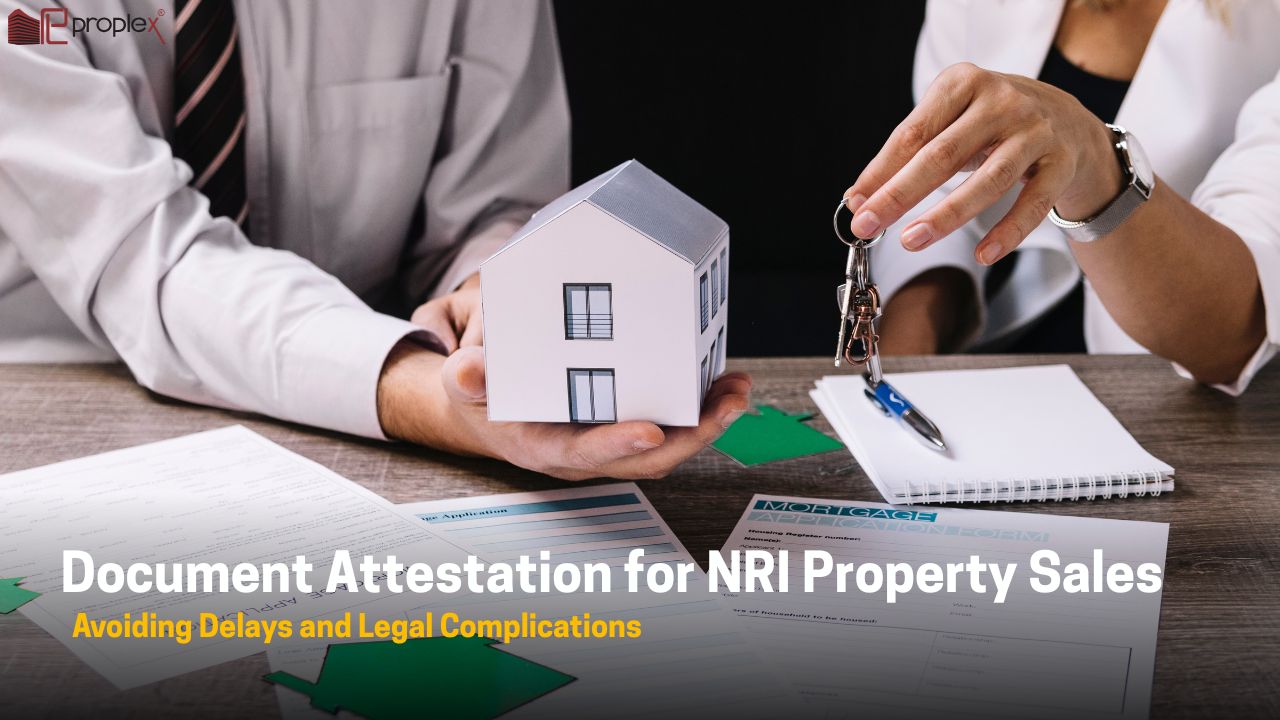Selling a property in India while living abroad? If you’re an NRI (Non-Resident Indian), you already know that the paperwork can feel like burdened by a pile of documents. What many sellers don’t realise, however, is that document attestation is not just a formality; it’s the difference between a smooth sale and months of frustrating legal back-and-forth.
This blog breaks down why attestation matters in NRI property sales, which documents need it and how to avoid delays that could cost you time, money and even buyers.
Why Attestation Matters in NRI Property Sales
When you’re not physically in India to sign documents or appear in person, your paperwork becomes your legal voice. Indian authorities, especially sub-registrar offices and municipal bodies, won’t accept documents signed or issued abroad unless they’re properly attested.
Here’s what that really means:
- Legal recognition: Attested documents prove authenticity and prevent fraud.
- Registrar acceptance: Without adjudication/attestation, sale deeds or powers of attorney may be rejected outright.
- Faster processing: Verified documents speed up legal and administrative approvals.
- Court-proofing: In case of disputes, attested documents are more likely to hold up in court.
Whether you’re selling through a family member, a legal representative, or even a buyer-appointed attorney, proper attestation keeps your sale legally secure.
Common Scenarios Where NRIs Get Stuck
At Proplex, we’ve worked with hundreds of NRI clients and we’ve seen first-hand where the process breaks down:
- A POA signed abroad wasn’t adjudicated → Registrar rejected it.
- Sale deed sent via courier without apostille → Buyer’s lawyer raised objections.
- Affidavit for title transfer wasn’t notarised → Delayed municipal clearance.
- Documents issued in a non-English language → Translation was missing, triggering rework.
These are not rare exceptions they’re everyday setbacks for NRIs who try to sell property without proper document attestation.
What Documents Typically Require Attestation?
Depending on how the sale is structured, one or more of the following documents will need to be attested before being accepted in India:
Power of Attorney (POA)
- If you’re authorising someone to sign the sale agreement or register the property on your behalf.
- Must be signed in front of an Indian Embassy official or notarised and apostilled.
Sale Agreement or Deed
- If signed abroad, it needs attestation before being accepted by the sub-registrar.
Identity Proof
- Passport copy of the seller is often attested to verify NRI status and identity.
Declaration or Affidavit
- Sometimes required to confirm ownership, clear title or encumbrance-free status.
NOC or Consent Letters
- Especially in joint ownership or inherited properties.
Pro Tip: If your documents are in a foreign language, certified translations in English (or the local Indian language) may be needed before attestation.
Types of Attestation You Might Need
Depending on where the document was issued and where it will be submitted in India, you’ll need one of the following:
Embassy Attestation
Required for countries not part of the Hague Apostille Convention, such as UAE, Qatar, Kuwait, and Malaysia. Documents must be:
- Notarised locally
- Attested by the Ministry of Foreign Affairs in your country of residence
- Attested by the Indian Embassy or Consulate
Apostille
Valid for Hague Convention countries like the USA, UK, Canada, Australia, etc.
- No embassy attestation required
- Documents need to be notarised and apostilled via the designated authority
Home Department or SDM Attestation (India-side)
If your document originated in India (e.g., POA made in India and sent abroad), state-level authentication may be required before MEA or embassy steps.
The Legal Risks of Skipping Attestation
Let’s say your Power of Attorney wasn’t properly attested. Here’s what can go wrong:
- Registrar won’t accept it, and you miss your buyer’s deadline.
- Sale deed gets questioned, especially in cases of disputes.
- Litigation or objections from co-owners, heirs, or third parties.
- Delays in repatriation of funds, because RBI requires valid paperwork.
Skipping attestation or getting it wrong can derail your property sale. It’s not just about red tape; it’s about legal validity.
How Proplex Can Help
Proplex Consulting LLP offers end-to-end document support for NRIs, making it easier to sell property in India without travel or delays.
Here’s what we do:
- Coordinate embassy/consulate/sub-registrar attestation for POA, sale deeds, NOCs, etc.
- Handle apostille processing through the MEA (Ministry of External Affairs)
- Provide certified translations for documents not in English
- Guide you on notary and Home Department formalities
- Manage courier and secure document delivery
- Offer real-time status tracking and timeline estimates
Whether you’re in Dubai, London, Toronto, or Sydney, we can help you legalise your documents remotely so your India-side sale proceeds smoothly.
Frequently Asked Questions (FAQs)
Q1: Can I sell my Indian property without coming to India?
Yes, provided you give a properly attested Power of Attorney to a trusted person in India who can act on your behalf.
Q2: Does my POA need to be apostilled or attested?
Depends on your country of residence. Apostille for Hague countries, embassy attestation for non-Hague ones.
Q3: How long does the process take?
Usually 5–12 working days depending on the country, document type, and sub-registrar response times.
Q4: Can I send scanned documents?
No. Only physical, original documents (or embassy-verified originals) are accepted for legal property transactions in India.
Don’t Let Paperwork Derail Your Sale
Selling property as an NRI already comes with enough challenges; don’t let attestation be the reason your sale falls apart.
With the right paperwork, attested the right way, you can:
- Close deals faster
- Avoid unnecessary legal risk
- Save time, money, and frustration
Let handle the red tape while you focus on the bigger picture finalising your property sale with confidence.
Need attestation support for your property documents?
Call Proplex Consulting LLP or WhatsApp us now.
Or drop us a message and our team will guide you step-by-step.


Leave a Reply